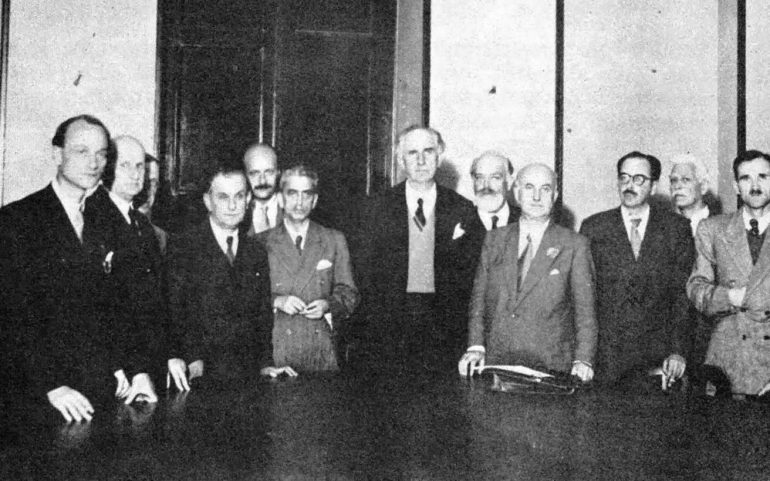The imposing hotel "Astoria" Thessaloniki when it was built in 1929 at the junction of Agia Sofia and Tsimiski streets, it was one of the few at that time that had a bathroom in one of its rooms, something that you only encountered in similar companies in major foreign capitals.
During the Civil War (which is conventionally limited to the period 1946-1949), the hotel will inadvertently play a significant role. It is from there that the general secretary of the K.K.E. Nikos Zachariadis in September 1947 to climb the mountain with his Left competitors without being noticed by the security men who were watching him.
He stayed in the same hotel in 1948 and the American journalist George Polk.
When the hotel staff found out that he was late to return, they declared him missing and about a week later his body was found in the waters of Thermaikos without it has been completely clarified who killed him until today.
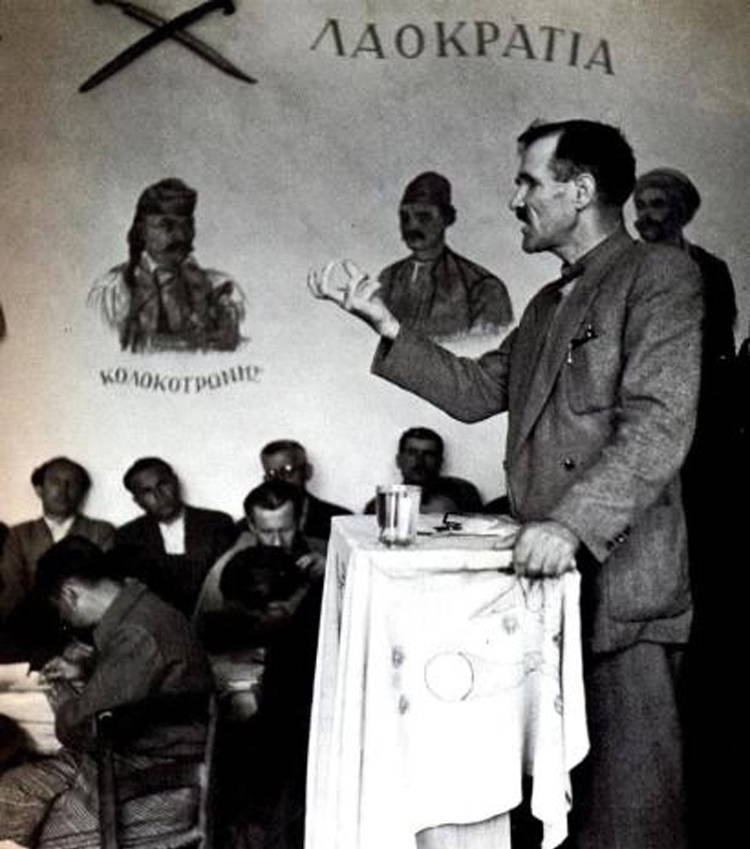
At the hotel "Astoria" ended up and Giannis Zevgos in 1947 before he was killed. A teacher by profession and a journalist, he was a senior executive of the K.K.E. and E.AM. (National Liberation Front), who participated as Minister of Agriculture on behalf of the Left in the government of National Unity formed by George Papandreou in October 1944, as soon as the Germans left Athens.
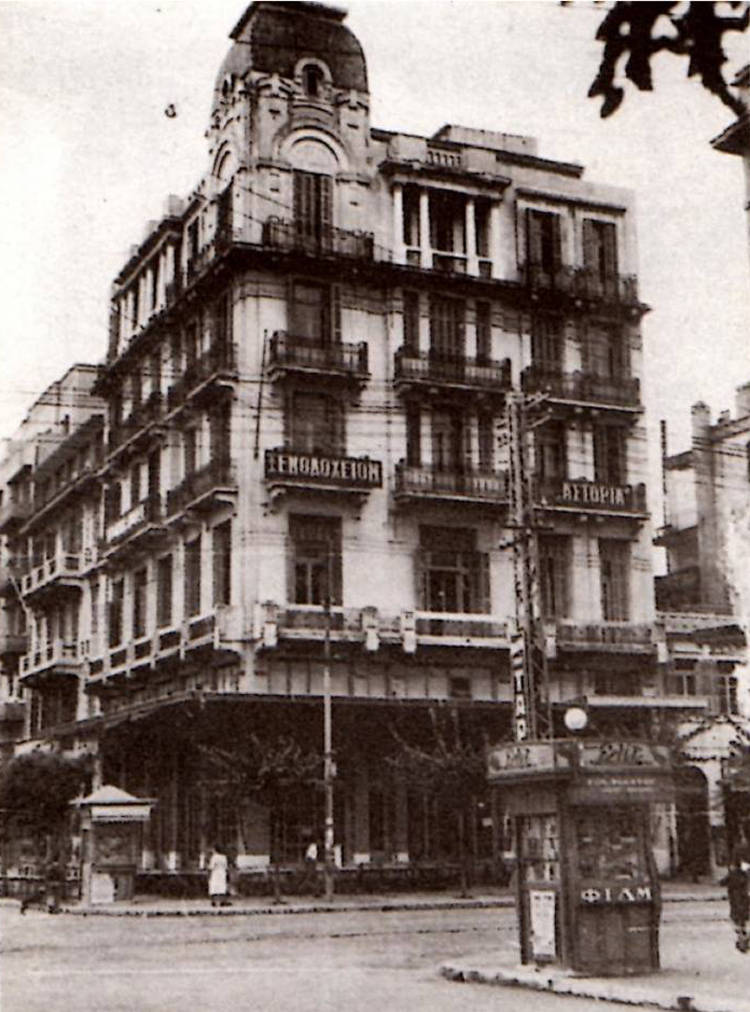
Since then, however, a lot of water has flowed into the political groove in a short period of time. In less than a month he is resigning along with the other Left ministers as the country embarkes on the adventure of the so-called Decemberians who are considered the prelude to the next phase of the Civil War, with the bloody conflicts spreading to most of the country.
As an alternate part of the Politburo of its Central Committee KKE will be in Thessaloniki in February 1947 to watch live the work of a Commission set up by the United Nations Special Committee on the Balkans (UNSCOB) and to investigate the circumstances under which the Civil War began and the situation prevailed on our borders as the northern neighbors had sided with the eastern bloc. The Committee was hosted in the current building of the Thessaloniki Chamber of Commerce and Industry, at 29 Tsimiski Street.
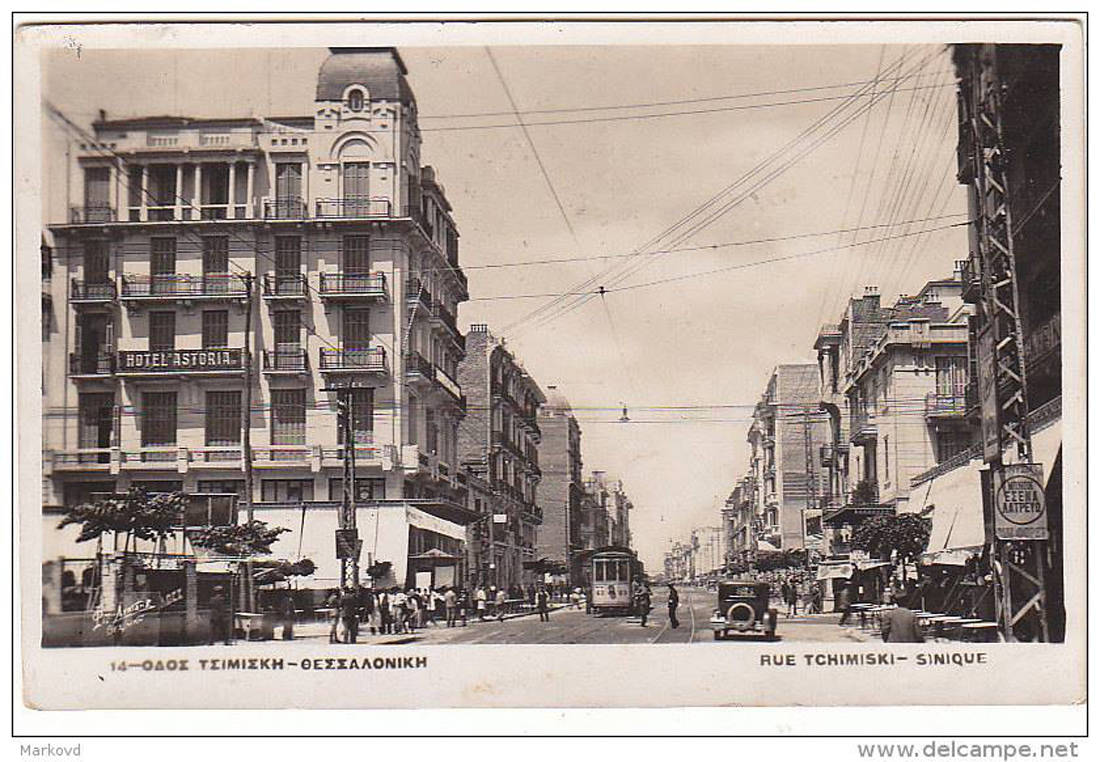
Every day the unfortunate party executive had catalyzed in the hotel "Astoria".
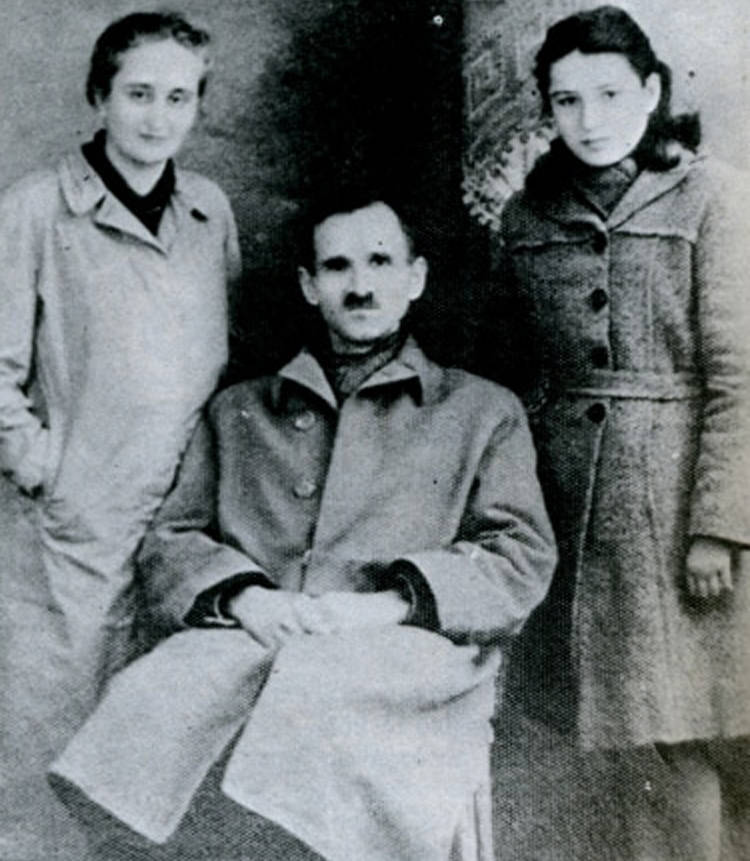
Around 10:30 in the morning of March 20, 1947, Zevgos (whose real last name was Talaganis, but because he signed in the party press with his wife Kaiti as Zevgos for conspiratorial reasons, his nickname remained) leaves his room and goes to the offices of the newspaper "Agonistis", at 1 Platonos Street, in order to write a memorandum to the UN Commission. citing up-to-date information on the persecution of his comrades by state power and right-wing paramilitary organizations.
He is personally distinguished by moderation as he believes that there is no need for a revolutionary overthrow of the existing regime and the overthrow of the proletariat, but as he pointed out in his article, the transition to popular democracy and then to socialism by democratic methods of political crisis was possible.
At the end of his memoir he will go to the restaurant "Elvetikon" for food, as he did every day. He has not realized that a man around 30 is sitting outside watching him.
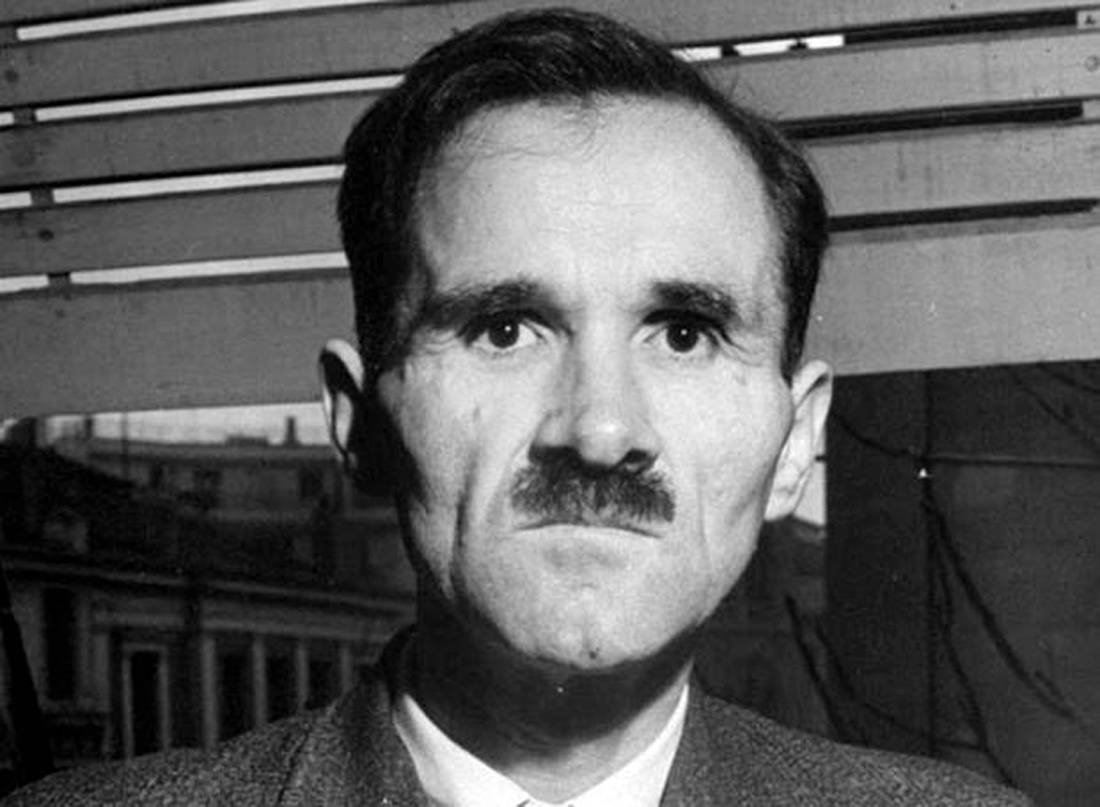
On the way back to the hotel, the stranger picks him up. Time has begun to count dramatically for Zevgos' life. Around one and ten in the afternoon, at the time he was going down Agias Sofias Street, he approached him.
He makes one revolver and throws backwards three times against him. The victim's breath is taken. He is bleeding uncontrollably. It begins to lose its light. He makes desperate attempts to get up but the killer goes over him and shoots him again. It's the gratuitous shot.
The perpetrator, full of adrenaline, runs away from Agias Theodoras Street as citizens who have seen what happened start chasing him, including a gendarme. "Catch him, he is a murderer" will shout a sailor named George Bezas. The perpetrator will fall on a passing English soldier who, hearing the voices of his pursuers, will arrest him at the corner of Tsimiski and Aristotle, but his accomplices, who were noticed by some, take advantage of the situation and escape.
As revealed, The killer was the 32-year-old butcher Christos Vlachos, a former communist from Serres. During the preliminary investigation, he will claim that he killed him out of indignation for what he suffered because of him in Bulkes, from which he had returned a month and a half earlier. For those who do not know, Bulkes was a small ruined village in the then Yugoslavia near the border with Hungary (today it belongs to Serbia as Maglits) which from May 1945 began to send officials and members of the K.K.E. and the E.L.A.S. in order to protect themselves mainly from the persecution of parastatal right-wing groups.
It is estimated that by the end of the year the number of refugees who had gone there reached 5.000. In the camp that had been set up, party members worked, were trained and enlightened on the principles of communism. Much has been written about the living conditions and there are several allegations of authoritarian behavior by the appointed camp leaders, and even the killing of dissidents.
The arrested murderer will claim that as soon as he saw Zevgos in front of him, "he went up in blood on his head. "The communists tortured me because I did not agree with them."
In his apology he will also mention that the communists had prostituted his wife, with whom he had divorced, while he was in Yugoslavia. However, she will later claim that she divorced him because he was a traitor to the party. Nobody believed him, while in Macedonia there was no tradition of crimes for reasons of honor, neither against the perpetrators nor, much more, against like-minded people.
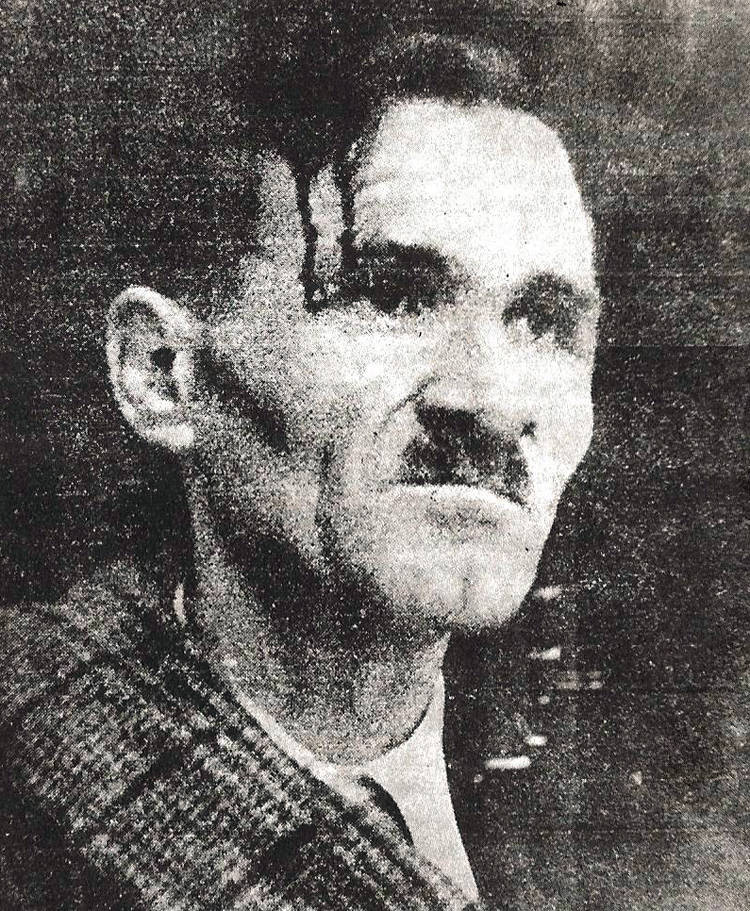
The press of the time presents the crime according to its political position. Let us not forget that we are in the middle of the Civil War. The pro-government newspapers will talk about clearing accounts, while the communist Radical will report that it is a shameful act of the "monarcho-fascists".
Immediately after the murder, a delegation of E.AM. under George Sianto, Costas Gavriilidis and S. Kritikos will visit the then liberal Prime Minister and banker Dimitrios Maximos (his personal home was the current Maximos Palace) and the vice presidents of the government Sophocles Venizelos and Constantinos for Diantos fact. But they do not achieve anything substantial. On the contrary, the arrests and deportations of the Left are multiplying, as we will see below.
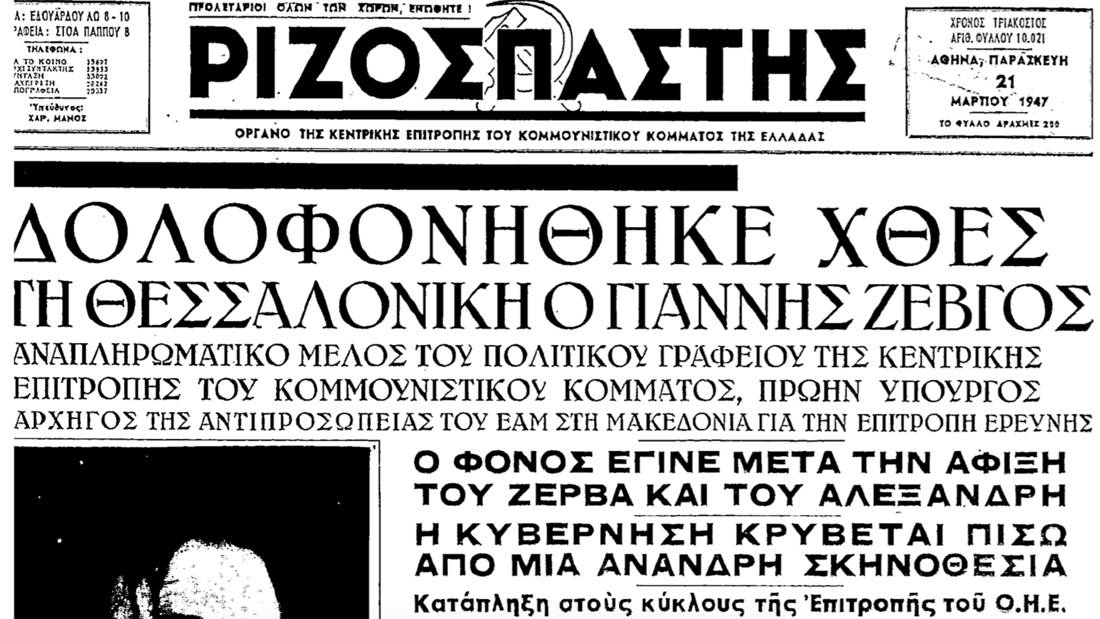
But who planned the crime? About two weeks after the burial of the victim (which will be done in a hurry in the cemetery of Evangelistria in Thessaloniki in the presence of only his wife and daughter because the authorities forbade the body to be transported to Athens) a letter will be published in Rizospastis. It had reached the hands of the secretary general. of the K.K.E. Nikos Zachariadis from March 24 or 25 but was published in the newspaper on April 3.
It is signed by the 33-year-old tobacco producer, Serraios and he, Nikos Sidiropoulos, accomplice of the murderer, once a communist and also a former inmate in the Bulkes camp. He will argue that the crime was organized by the A2 office of the XNUMXrd Army Corps and the ESA Vardari, under the high supervision of the Minister of Public Order Napoleon Zerva, a leading figure of the right-wing National Democratic Hellenic Association (E.D.E.S.) during the years of the Occupation, the second most important resistance organization after the Hellenic Liberation Army, which from one point onwards were torn apart. In the six months that Zervas remained in office, the number of death sentences issued by the Extraordinary Military Courts tripled.
In his letter, Sidiropoulos will also argue that the plan also included the assassinations of Dr. Ioannis Passalidis (leader of the Socialist Party of Greece and later chairman of the United Democratic Left party in the post-war years), A Dilakerodos Deliladoros and Association of Athens before the junta of 1967).
Several years later, Markos Vafiadis, the supreme military commander of the Communist Democratic Army of Greece in 1947, would claim that Zevgos was assassinated from within, on the orders of the KKE leadership.
As he will say, the aim of the general secretary Nikos Zachariadis was "to cement the intransigence of the extremities on both sides". In fact, it leaves clear hints that Zachariadis was the one who had given the orders to exterminate other internal party opponents such as Aris Velouchiotis, Nikos Ploumpidis and Konstantinos Karagiorgis, not necessarily by killing them.
In fact, he describes Christos Vlachos as a good and loyal comrade of the Thessaloniki party organization of the KKE who was sent to the Bulkes camp but from there was expelled by Zachariadis along with 105 other ELAS members and was forced to return to Greece.
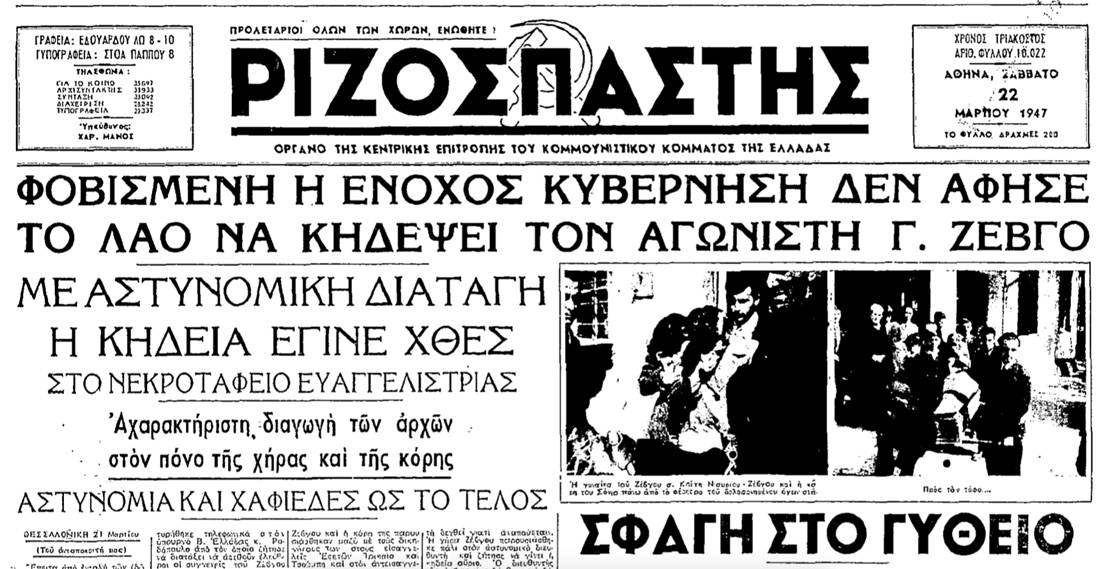
Christos Vlachos, however, as the natural perpetrator of the murder, would be sentenced on May 28, 1948, to just two years in prison, at the same time that editors and printers of communist publications could go to prison for up to 10 years if they published anti-government articles. . Indeed, after two years he is released from prison and escapes.
It will be located in remote Buenos Aires, which at the time was a refuge for Hitler and fascist fugitives as well as criminals from around the world. He will stay in Argentina for several years but in 1968, through the dictatorship of the Colonels, he decides to return to Greece. Returns to Serres. For the local community it is fingerprinted. We treat him with contempt for his act even though so much time has passed.
He can not stand it and it seems that he is starting to lose his mind. A journalist for the Acropolis newspaper found him in 1981 in the Leros psychiatric hospital, although he was clearly enjoying privileged treatment as he had his own room, an assistant who served him personally and circulated in a suit. In an interview given and published on September 20 of the same year, he will argue about what happened 34 years ago that "I worked for Greek and allied counterintelligence, I fought the communists and the Turks. So I carried out the order I received from my superiors, to kill Giannis Zevgos. I had to obey. The homeland was in danger, I had to clean it of the communists. I also had to kill the… Sultan of the KKE (s.s. means the secretary general of the party, Nikos Zachariadis) ".
- Georgios Sarris is a journalist - member of ESIEA, honored by the President of the Republic with the Ath. Botsis Award for the objective and complete presentation of historical political issues.
